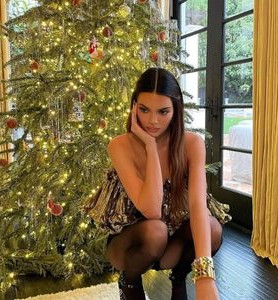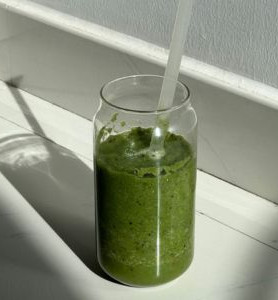On Screen Lovers Anne Hathaway & Nicholas Galitzine
Remix chats with the two stars of the rom-com that everyone is talking about, The Idea of You... The well established Hollywood actress Anne Hathaway plays Solène, a 40-year-old single mom who begins an unexpected romance with 24-year-old Hayes Campbell (Nicholas Galitzine), the lead singer of August Moon, the hottest boy band on the planet.
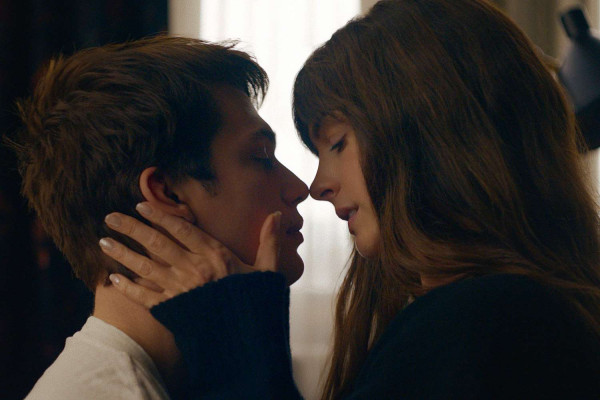
Directed by Michael Showalter, the film is based on the book by Robinne Lee, who is said to have been inspired by Harry Styles for the character of Hayes (whose band has more than a passing resemblance to One Direction). Here, Anne and Nicholas talk about how special their chemistry was on camera, how they prepared for their roles, and just how much of the inspiration was from Harry Styles...
So Anne, would you say The Idea of You is about the fantasy of another woman with a younger man, or does it deliver a message to allow women to be in relationships with younger men without fearing judgement?
ANNE: I think that it’s a movie about being in love without fearing judgement. And, you know, the world’s the same in a lot of ways but technology has changed it a lot. And I think we are confronted with other people’s thoughts, ideas, opinions and judgement a lot more. And I think the only answer is to be true to yourself and do what it is that makes you happy.
Nicholas?
NICHOLAS: I think she answered that perfectly. I have nothing to add.
You are at different points in your careers. Where does this movie fit for either of you in terms of your intention?
NICHOLAS: Well, I mean, I think, for me, obviously, there was a large draw. I’ve been a fan of Annie’s for a while. I mean, she’s just consistently incredible and has done really versatile pieces of work. But I think I saw a really interesting story that could appeal in a sort of popular culture way but also had a really beautiful message that kind of seemed to go through the whole story. And so, for me, at this point in my career, I like searching for things that both kind of have wide appeal and are really amazing character pieces. So it was kind of a no-brainer for me at this point in my career.
ANNE: Thank you for all of those lovely things! I, first of all, just want to say became such a fan of Nic Galitzine during this experience. And I think that if you don’t know the name, Nic Galitzine before this film, you will 100% know it by the time the film comes out. I’ve made a lot of different types of movies in my career. And a lot of them fall into the category of ‘feel-good’. And the thing that I love about this movie is, to me, it’s a ‘feel-everything’. You experience so many emotions in this movie. You experience joy, there’s humour, there’s heartache, there’s loss, there’s longing, there’s pleasure, there’s so many things happening. And Michael Showalter, our director, was so bold in his desire to explore all of that. And to kind of, I don’t know, create this extravagant offering that was really focused on beauty, pleasure, enjoyment, fulfilment, and, for me, a really key part— a woman who has experienced trust trauma and learns to live through it and enjoy what might turn out to be the back half of her life.
What do you think is the perfect recipe to make a rom-com in today’s day and age? And do you think that the rom-com genre has come back with a bang now after lots of spy and superhero films?
NICHOLAS: I think it definitely has come back with a bang. I think there was this golden era of rom-coms. I can think of, you know, the Hugh Grant movies. I think maybe given the state of the world in the last few years, people really want some sense of escapism and feel-good. So I would definitely say they’re back. I mean, what makes a perfect rom-com? I don’t know. Maybe Annie..
ANNE: I don’t know. I mean, one of my favourite rom-coms is one with Clark Gable and Claudette Colbert called It Happened One Night. And so anytime you can get believable tension and conflict between the two characters, that’s very juicy. Conflict is really important, but it has to be a pleasurable conflict. One of the things that I thought was really interesting about this movie is that our characters actually get along really well, funnily enough, and that seemed very fresh to me, that this is a relationship that is clearly working for these two people. It’s just outside the parameters of what society thinks a relationship should look like. And so the conflict actually isn’t between the couple. It’s between the couple and the world. And I just think it’s really interesting, that we can’t just be happy for people when they’re happy, we try to complicate it. And I love that these two people decide to keep going deeper into their love and not really care what the world has to say about it — until they must.
Anne, your character and is very emotional, very fragile. Do you think that Nicholas’ character’ strength carries the relationship through the movie?
ANNE: I don’t mean to contradict you, but I don’t think my character is fragile at all. I think that she wears her emotions in a visible way. But that doesn’t make somebody fragile, and it doesn’t make someone else strong. I think my character has had the strength of being a small business owner. I think she survived a pandemic, she survived a divorce, she built a life for herself, slowly, step-by-step, she was a young mother. And I think that she’s vulnerable to love in a way that feels really personal to me. But I don’t think Solène is fragile.
NICHOLAS: To sort of second that, I think, Hayes might sort of seem outwardly very charismatic and in control of himself, but I think based on the life and the person he’s had to kind of become, you know, being in the spotlight his entire life, I think Solène’s vulnerability is this massive calming and opening process for Hayes. I think he really just kind of blossoms through this relationship, because he feels like he’s able to be vulnerable for the first time.
ANNE: Sorry, I didn’t mean to get shouty and worked up. I just feel very protective of my character. And I just want to make sure that she’s understood in this first introduction to the world. I apologise for getting so passionate.
Passion is good...
ANNE: I hope not rude, though. [laughs]
No, it wasn’t at all
ANNE: Thank you very much.
Nicholas, did you watch a lot of One Direction and take that videos before making this?
NICHOLAS: I know what you’re heavily implying [laughs]. Look, I did watch a bunch of One Direction because I just feel like, you know, growing up within that sort of Zeitgeist they were kind of the obvious, I guess, but also, as I was also going to the dance training and singing training, we looked at bands like BTS, within the K-Pop world and some of the boy bands from the ‘90s. And they all share something, which is they’ve gone through a process, they’ve been built, essentially, they’ve been assembled by these kinds of teams of people. And I think that was very fascinating. But yeah, there were a couple of real-life references very particular to the story that we were portraying in the movie that were quite useful to me — I won’t mention specifically what they were.
ANNE: Now you’re heavily implying! [laughs]
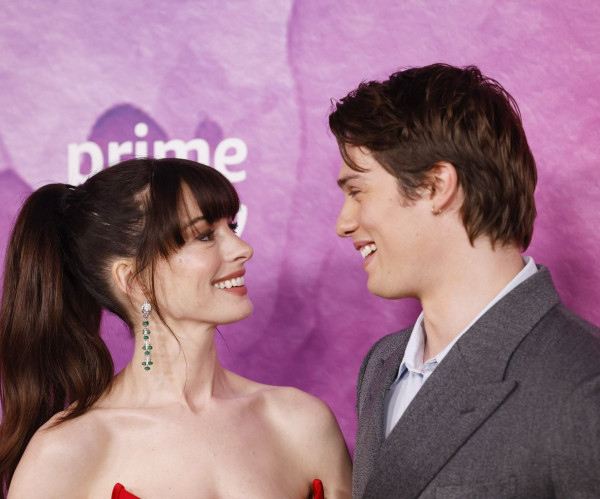
Anne, did you have a pop star in your mind while your character was falling in love?
ANNE: Oh no, no, no — Nic was more than enough. [laughs]
How did you work together on your chemistry and connection and what was your icebreaker?
NICHOLAS: The icebreaker was kind of the chemistry test, really, wasn’t it? Yeah, we had a really intense, but like, to be honest, I feel like the most incredible audition experience I’ve ever had. Where, you know, I came in to meet Annie and I was such a massive fan already. But she was so giving. And I really believe Annie is one of the best in the industry at being able to just access this deep well of emotion that she has. We had to do a very sort of emotional scene in the chemistry test. And we also got to dance with each other. We improvised the dance, which I’m not sure how that was for you? But...
ANNE: It was my idea [laughs]. So we had to do this chemistry read. I’m sorry to talk about this part, but we met with more than just Nic for this. There was an audition process and the question was — how do you figure out if you have chemistry with someone? Because you can read a scene and you can emote together, you can do things, but that essential thing where when you’re not talking and you’re just next to someone, how do you know if it’s there? And I suggested that we ask each actor to bring in a song that their character would play for my character, and then try to get me to dance. And Nic and I, I don’t know, he pressed play and we were just grooving. And we were dancing. And everybody in the room was enjoying watching us dance. And we realised, well, we had chemistry. [laughs]
NICHOLAS: It’s crazy. Because you think, you know, the two people meeting each other for the first time, I mean, that is a potential sort of train wreck waiting to happen. But it felt really natural and organic. And I think that’s the thing you are looking for, as an actor, is like that spark.
ANNE: Yeah. And then in terms of developing that we just started talking and then we just kind of haven’t stopped. [laughs]
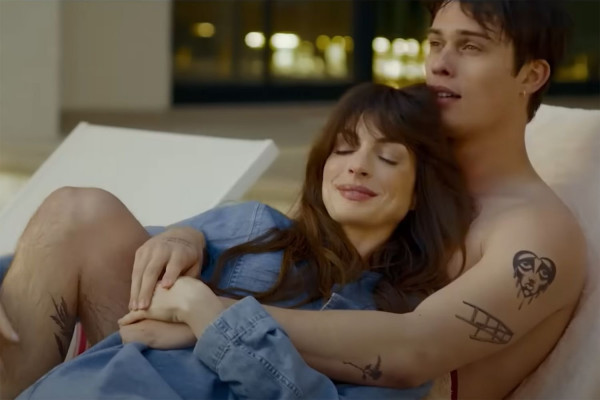
What would you do for love? And how do you keep love alive?
NICHOLAS: Well, you’ve [to Anne] been married for a while, so I think you can speak to a long-term relationship better than I can. But I feel like, you know, love is something that continually evolves and grows and you become partners with someone and it’s collaboration and yeah.
ANNE: Love is so personal. And that’s one of the things about Solène and Hayes — I’m really happy for them that they found each other. Because it’s more than just this illusion, it’s more than just, you know, kind of like this animal attraction. It’s more than just passion. They actually have something very real and very rare. And we all know that in this life where people have to deal with stress, people have to deal with illness, people have to deal with grief, people have to deal with bills, I mean, there’s just a lot going on that pulls at us and keeps us kind of from feeling happy all the time. If you find someone that lights you up the way Solène and Hayes light each other up, I’m of the opinion that you should just be happy for them.
Your character has a french name and she travels to Paris with Hayes. In real-life what is your connection to France?
ANNE: Well, my grandmother’s French. And Solène’s grandparents are French. In the book, it’s Solène’s parents, but My French isn’t good enough to pull that off [laughs] — we didn’t quite have enough time to learn. So Solène wound up having French grandparents. But the adaptation process of bringing the book to the screen — a book which, by the way, I love — was very interesting because we had to make a few key changes. And I feel like Solène having French parents in the book versus her having French grandparents in the movie kind of tells you everything that you need to know. In the book, she’s sort of a high-end art dealer at a very, very prestigious international gallery with a well-heeled clientele. And in the movie, she’s got a local gallery in Silver Lake, she represents local artists. So I think the movie presents maybe a person a little bit more grounded in day-to-day life. In the book, it’s a little bit more, I don’t know, kind of bourgeois aspiration— in a very pleasurable way. But that wasn’t your question. That’s just me giving details about the movie [laughs]. My relationship to France is — yes, always! It’s such an enriching place. And I wish that I could have devoted a more concentrated amount of my life to being there and absorbing it and learning from it. And especially learning the language. You know, that hasn’t worked out for me, but I’m always trying to learn little by little like, I haven’t done my Duolingo yet today, but I have it ready to go, [laughs].
How do you both deal with social media? Especially being new to fame Nicholas?
NICHOLAS: Oh, God, I think for me, I’ve kind of undergone a bit of an evolution in the last few years whereby I felt initially I had to kind of show an intimate part of myself, I had to live my life in social media through this sense of candour otherwise I was being inauthentic. But now, I really like to keep a part of my life private. And I feel like I’m becoming a more and more private person. And I think, you know, social media can be very connective and very great in some ways, but I prefer to sort of dip my toes and then kind of pullout of it when I’m done, when it doesn’t seem to sort of serve a kind of a purpose, I think, through our job, through our art. So yeah, that’s kind of my approach.
ANNE: My approach, so I went on Instagram, like, I think it was over 10 years ago now, when the platform was still finding itself. And I’m really grateful to it, because I feel like I was able to use my voice, find my voice really, on it and kind of speak directly to people. And then at a certain point, a number of years ago, I found myself, I don’t know why, I just didn’t want to share as much. It felt like the platform changed into something that felt more work-based as opposed to something that felt really, really personal. But by that point, you know, I’d developed it and cultivated it and I didn’t want it to go to waste. I’m really appreciative to have a way to connect with anybody who chooses to follow me. So right now, I use it for work, but it’s an ever-evolving thing, isn’t it? Because sometimes you go through periods where you feel very private and you can’t imagine sharing the details of your life and then you go through periods where you feel more open. And so I like to have a sort of flexible relationship with it, in terms of what I post. And then in terms of me personally, I don’t spend a lot of time on social media.
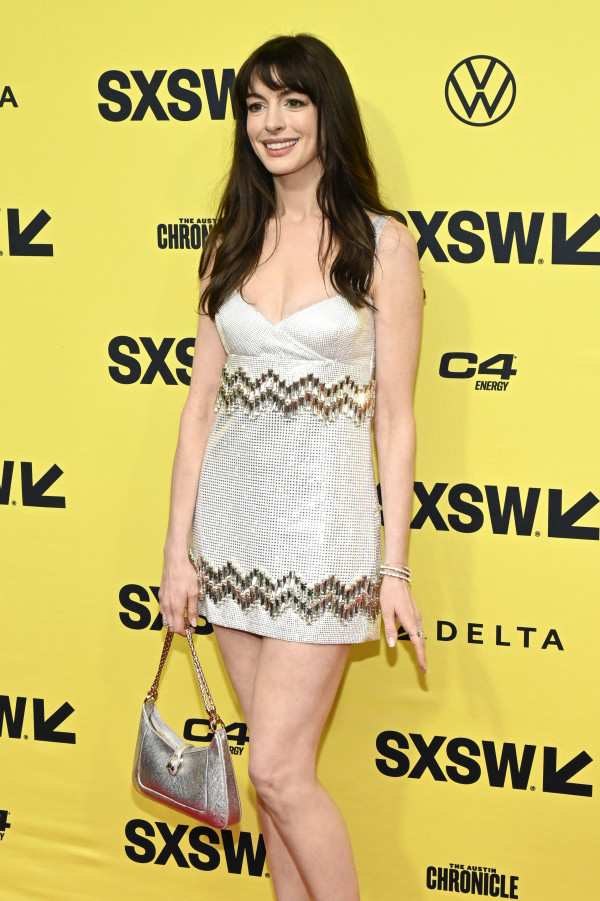
Did you really go to Coachella to shoot the film? How was that?
NICHOLAS: Oh, we didn’t go to the real Coachella. We fabricated Coachella in Atlanta, at 5 am in the morning during the winter, while I was wearing a sleeveless vest pretending it was a really hot summer evening. I mean, it did feel extremely real at times. We had like a 400/500-person audience. So, for me, as someone who’s never performed in that capacity before, I mean, it felt extremely real. And what was really special about it is the way our supporting artists were kind of prepared to sort of act and help support the scene. They’d been given posters of the band, they knew all of our names, they knew the song beforehand— so it really did feel like a real gig we were performing. And you [to Anne] were in the thick of it so I wonder what you kind of felt?
ANNE: Well, first of all, I have a shoutout to Amy Williams, our production designer, because she made you think that we were at Coachella — and that’s pretty massive. But it was incredible. We were just on a field in Atlanta and they built this huge stage. And I also have to shout out Dani Vitale, our choreographer, because she was integral in making sure everything felt really authentic. And it was just fun. It was so much fun to be there. And the band that Hayes Campbell is in is called August Moon. And the fans are called MoonHeads. And they identify themselves by pouring glitter mousse all over the tops of their heads. And on the first night, the only people who had the glitter mousse on were the background artists, but by like a third and the fourth night the entire crew had gotten into it. And we watched like Moon Head fans blossoming authentically in the real experience. And it was really exciting that after three days, people were not sick of the songs.
I found the energy grew from night-to-night. And yeah, it was one of those things where it could have gone either way. It could have been, as you said, it was in the middle of winter on a field in the middle of the night, so it could have been kind of painful — but I actually think we had a lot of fun.
NICHOLAS: We had so much fun. And it was actually sort of the last portion of filming for all of my bandmates as well. So even though it was halfway through production, it did feel like all of our hard work had kind of culminated to those nights. So, by the end, they were like, ‘You’ve got one more run through of Guard Down’’. And we were like, ‘Can we just do like a couple more?’ Like we wanted it to kind of keep going on but the sun was starting to rise! And they were like, ‘I think we’ve got it.’ But yeah, I’m really glad you were convinced we were actually at Coachella, that means a lot.
Finally, what can audiences expect when watching The Idea of You?
ANNE: There’s so much in this movie— there’s dancing, there’s love, there’s beautiful clothing. And there’s more dancing. And there’s concerts and amazing art. And there’s two people justkind of keeping it real with each otherand falling in love with the process. There’s a line in the movie where Hayes says to Solène, ‘It’s hard to trust people, isn’t it?’ And they are two people that have good reasons not to trust other people. And I think it’s really beautiful to watch them sort of open to each other. And to watch two people who, especially during these times when everybody’s so fearful, learn to feel safe with each other and become a safe place for each other.



